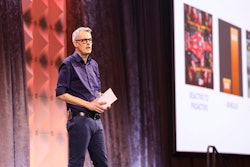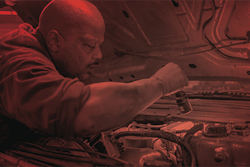Potter Webster Company
answers by Dennis Webster
WHY DID YOU START THE BUSINESS?
In 1918, O.T. Potter Co. was founded by Orin Potter. O.T. Potter Co.’s primary business was to supply automotive aftermarket fenders and exhaust systems. In 1940, J.R. Webster and his brother, Walter Webster, joined forces with Orin Potter and changed the name of the company to Potter Webster Company. In 1941, J.R. Webster acquired his brother’s shares of the business, leaving him with a partnership with Orin Potter. In 1945, J.R. Webster became the sole shareholder of Potter Webster Company, buying all Orin Potter’s shares.
In 1965, Dennis Webster, son of J.R. Webster, came to work full time for P.W.C. At this time, the primary business was supplying friction products and friction-related services to the logging industry. In 1970, Potter Webster moved to a new location. At this time, the primary business began to shift to distributing heavy-duty truck parts, therefore the company added the product lines of several major brand-name manufacturers. As the company expanded, so did the building. There were two additions to the original building bought in 1970. In the mid 1970s, Dennis Webster began to manage the day-to-day operations of the business. J. R. Webster died in 1986, leaving Dennis Webster as the president.
WHAT’S BEEN YOUR TOUGHEST BUSINESS DECISION?
The toughest business decision we make on an ongoing basis is that of expansion, contraction and diversification of our business. Over the years, the decision to grow our business, has outweighed downsizing 10 to one. We always have used our internal resources to grow and stay successful. When looking at opportunities, you have to determine whether or not that product or service has the right synergy for your company.
WHAT WAS YOUR BEST BUSINESS DECISION?
Back in the early ’80s, after we acquired a company that was servicing a different segment of the heavy-duty aftermarket, it was apparent that the new business had a whole different product knowledge base than we had. To try to meld the inside and outside sales forces together didn’t make any sense, so we created a division of the company just for their market. Since then, we have created four other divisions that require special product knowledge to service our customers. So far this has served us very well. As time goes on we do a lot of cross training so more sales people have multi-division product knowledge.
WHAT WAS YOUR WORST BUSINESS DECISION?
In 1987, we made an acquisition of a business in the eastern part of our state that did business in both automotive and heavy duty. In doing our due diligence, we forgot to look closely at his customer base to see what products were generating the majority of his profits. So when we made the decision to get out of the automotive part of the business, we signed our own death warrant. Two years later and a loss of a few dollars, we left town with our tail between our legs. So far we have learned our lesson.
WHAT IS THE BEST WAY TO KEEP A COMPETITIVE EDGE?
By gathering as much information on the marketplace as possible! You have to make sure that you are well enough informed on what the competition and your customers are doing so you can analyze that against your strategy.
We have found that the price of products is a big factor in customer loyalty. Customers are starting to change that theory by looking more and more at our service capabilities, as well as our product knowledge. Potter Webster has put a lot of dollars, not only ours, but our supplier partners, into customer training programs and are finding this helps us maintain a competitive edge.
WHAT IS YOUR FIVE-YEAR VISION?
To continue to diversify our products and services to better serve our customers. To increase market share, we are looking at better ways to service those customers, even if that would mean branching out into more locations. We know that we need to expand our service capabilities to include all products we sell. We also will continue using technology to grow our business into the future.
WHAT IS YOUR BUSINESS PHILOSOPHY?
We have found that you must have your vendors become your business partners to help expand your sales force. Teamwork has been the key for our associates to lead us into the future. Staying on top with the changing technology of today, as well as our knowledge of the products we deal in on a day-to-day basis.
WHAT IS THE BIGGEST CHALLENGE FACING THE AFTERMARKET?
The oversupply of generic aftermarket products in both the independent and OES channel has created a lot of pressure on gross profits for both markets. Consolidation has not seemed to alleviate this challenge. It will take another few years of market flux to see any relief, as far as we can tell.
HOW DO YOU SEE THAT CHALLENGE BEING RESOLVED?
I’m sure there is a lot more consolidation that will be going on not only in the manufacturing community but in the independent aftermarket and truck dealership areas. Our position is to be a leader, not a follower, when it comes to survival. Those with the financial wherewithal will be in the best position to be standing in the years to come.
DURING YOUR TIME IN THE INDUSTRY, WHAT HAS BEEN THE MOST SIGNIFICANT CHANGE?
I’ve been in this industry 50 years and the advent of the marketing / buying groups has been the biggest change for this industry. Originally formed to offer parity between the OES’ purchasing power and the buying power of the independent aftermarket, they have changed the landscape of how we buy our products and how we take them to market. All and all, they have been a good thing from the distributors’ perspective and most manufacturers seem to live with them.
WHAT ADVICE WOULD YOU GIVE A YOUNG PERSON CONSIDERING A CAREER IN THE AFTERMARKET?
The career opportunities in the industry are numerous for those willing to learn in an atmosphere of on-the-job training. Schools do not offer a lot of specialized courses in our industry. Northwood University offers a limited opportunity in education for our industry, but so far geography has played a role in their viability. We need more localized efforts and more basic skills.
HOW DOES YOUR BUSINESS CONTRIBUTE TO THE COMMUNITY?
We mostly join local associations through our industry to keep up with local businesses that we will partner with. We believe that education is one great selling tool, so we put on at least one class a month in some technical field. We have been in our community for over 68 years in Portland and 25 years in Longview. We buy locally as much as we can and take part in local industry events.
WHAT DO YOU KNOW NOW THAT YOU WISH YOU KNEW WHEN YOU FIRST GOT INTO THIS BUSINESS?
This is a great and ever-changing industry with no two days that are the same. Early on, I thought the grass was always greener in another industry; but I have found that it doesn’t get any greener then here. I have found making wrong decisions has only strengthened me to make the right ones in the future. You learn from them and go on.
WHAT MOTIVATES YOU EVERY DAY?
The people in the industry and trying to stay one step ahead of the competition.






